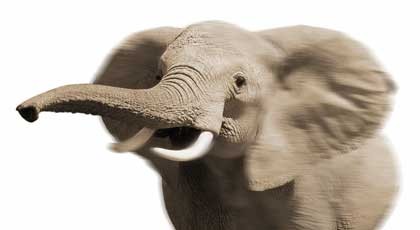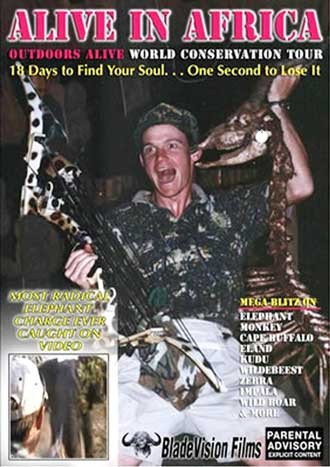Nontraditional hunting video follows blood trail from Texas to Africa
In 2003, while tracking a herd of elephants on 880,000 acres in Zimbabwe known as the Save River Conservancy, San Antonian Razor Dobbs followed closely behind Gordon Duncan, professional hunter and guide for the Shangaan Tribe. It was Dobbs’ third bow-hunting trip in South Africa.
Hoping to capture footage of the herd and to get a look at the animals’ tusk size, Dobbs and Duncan soon found themselves in the path of a charging 5-ton elephant.
“That elephant knew we were following him,” Dobbs, 35, told the Current, describing a scene from Alive in Africa, a high-energy, underground hunting video released last month by the San Antonio-based production company BladeVision Films. “At first I thought it was a bluff charge because they are known to do that, but I know enough about elephants that as soon as they break a 10-yard barrier, they can’t stop.”
As the elephant barrelled through a few small trees, ready to end the crew’s safari, Duncan made a quick decision: He raised his rifle and brought down the surly beast with a single shot to its head.
“When he busted through those branches, I knew it was the real thing,” Dobbs said. “At that point they won’t turn it off and it’s kill or be killed.”
Dobbs felt there was a generation gap in hunting videos currently on the market. “Other hunting videos leave you empty,” he said. “Most have some lame porno music and some Bubba-guy going, ‘Well, you know what were gonna do today? We’re gonna go up there and see if we can get us a bear.’”
In Alive in Africa, Dobbs uses unadulterated footage and a soundtrack consisting of original rock ’n’ roll music produced by BladeVision, which also serves as a music-publishing company, to create a film that he feels accurately represents him as a hunter. Dobbs, who at one time worked with guitarist and avid hunter Ted Nugent as a videographer for his concerts and personal hunts, instisted on documenting the entire, and sometimes explicit, truth behind the art of hunting.
“I don’t apologize for anything,” Dobbs said. “I try to show the real emotion behind hunting.”
Beginning with a tour through South Texas for what he calls a “warm-up,” Dobbs, with bow and arrow in hand, hunts wild boars. He splices the footage together in quick edits, fast-paced music, and close-ups of carcasses with arrow entry points. After bringing the “Black Hog Down” in Texas, Dobbs reveals some of his time in South Africa while among the Shangaan Tribe, as he hunts everything from eland to wildebeest to the Cape buffalo.
Originally from Kerrville, Dobbs, who earned his bachelor’s in agricultural communications from Texas Tech University in 1995, said he remembers his first deer hunt with his father when he was 8.
“My dad was a coach so I grew up playing sports and I knew what it was like when he was proud of me after a game,” Dobbs said. “But there was nothing I can remember him being more excited about than me shooting that first deer.”
Growing up eating venison “five nights out of the week,” Dobbs says he began to feel a strong connection to the animals. It is this respect for what he hunts, he said, that allows him to appreciate the entire cycle of life. He believes killing an animal “returns it to the earth” and provides nourishment to himself and, in the case of the elepant that attacked him in Zimbabwe, the entire Shangaan Tribe.
“We are natural-born predators,” Dobbs said. “I think the two most natural things on the planet are giving birth and killing your own food. When you shoot that arrow and watch it fly through the air, it’s primal.”
Although he has encountered criticism from animal-rights groups, Dobbs said he values the lifestyles of everyone he encounters and hopes that they, too, can have an open mind. There is no perfect way to live, he says.
“If you want to be a vegetarian, go wild,” Dobbs said. “I think that takes extreme discipline. But if you are saying that you are vegetarian and you don’t harm animals then you are in such denial. Go walk in the wake of a John Deere tractor on a farm where they raise green beans and find the carnage and destruction that there is of the habitat in the name of eating vegetables.”
But even if those who disagree with his recreational activities cannot accept him as a hunter, roaming the free range is something that Dobbs said became a part of him a long time ago.
“Especially in 2005, where everything is flip-a-switch and drive-thrus and instant this and that,” Dobbs said, “this stuff is sacred to me.” •



